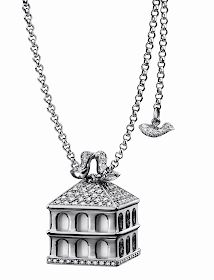Porcelain isn’t the first material that comes to mind when thinking of jewelry. However, when the company producing the pieces is the 300-year-old German porcelain brand, Meissen Couture, the material will be used.
Fortunately, two years ago the company created a new division, Meissen Italia, based in Milan, bringing modern design and new products that complement the craftsmanship of Europe’s oldest and best-known porcelain manufacturer.
This separate division produces everything from couture evening gowns and accessories to furnishings, artwork, and jewelry and watches. It’s headquartered in a 4,000-square-foot showroom on Milan’s most prestigious shopping street, Via Montenapoleone.
 |
| Mystery pendant and ring in green hand painted Meissen Porcelain, rose gold and champagne diamonds. |
Meissen Italia is largely a feminine world, every bit as delicate as the decorated porcelain pieces that makes its foundation. The jewelry I’ve seen at Baselworld for the past two years certainly reflects this. Hand-painted porcelain is the starting point for the various collections it introduced at Baselworld 2014. But the lines expand into other materials, including crystal, diamonds, colored gems and gold.
 |
| Violet Dragon Mystery Ring in hand painted dragon Meissen Porcelain with amethyst and gold and diamond swords (the brand’s famous trademark) set on a rose gold ring studded with diamonds. |
The brand’s “my little Mystery” collection features porcelain in various hand-painted shades topped with faceted crystal, giving the appearance of a colored gem. The oval-shaped rings, earrings and pendant necklaces are set with rose or white gold and surrounded by round diamonds.
 |
| Rose gold Follia necklace with 258 champagne-colored diamonds and hand-painted Meissen Porcelain. |
1739 Royal Blossom Collection targets a younger demographic, “but one which has just as high standards in terms of quality and value,” said Ileana Turrini, Meissen Couture public relations and communications Manager.
 |
| Blossom Boule ring in rose gold and pavé diamonds. |
The jewels are inspired by snowball blossoms, which were a gift from King Augustus II to his wife, Maria Josepha. Along with porcelain, the collection combines gold, precious stones and elastic knit. “It is a new way to think about jewelry simplicity and a more informal attitude as a way to create fascinating and eye-catching features,” Turrini said.
 |
| Two engagement rings, both with diamond center stones with one surrounded by a heart-shaped halo made of 12 white diamonds. |
There’s also a bridal line featuring simple, delicate solitaire engagement rings with a round diamond and white gold. In some cases the center diamond is haloed by diamonds in the shape of a heart. To go with them are white and rose gold wedding bands, featuring the crossed swords engraving, the famous Meissen trademark.
 |
| Mini Swords earrings in rose gold and full pavé champagne-colored diamonds. The crossed swords is the brand’s famous trademark. |
The crossed swords also makes its mark in its own jewelry line featuring gold and pavé diamonds and in other collections.
 |
| Pendant Bird House, with chain in white gold, diamonds and a Kogolong stone in the shape of a cube. |
The Haute Couture collection includes the Montgolfière collection modeled after the invention of the hot air balloon by the Montgolfier brothers in 1783, enabling air travel for the very first time. The hand-painted porcelain “balloons” depicts different scenes, such as Arabian Nights and butterflies, colorful dragons, the city of Venice, and Chinese themes. Similar Chinese motifs appear again in jewelry as objets d’arts based on pagodas and bird houses.
Perhaps a nod to the Chinese who were the first to master porcelain production but more likely a tradition of Messen from its beginnings to use fanciful Chinese-inspired in many of its porcelain works.
Please join me on the Jewelry News Network Facebook Page, on Twitter @JewelryNewsNet and on the Forbes website.
